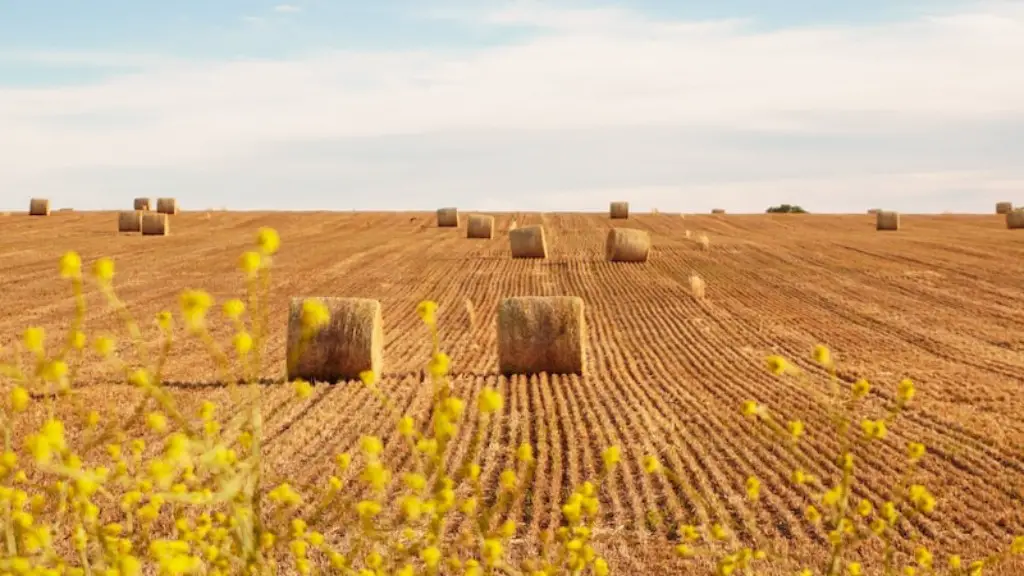A creed is a set of beliefs or principles that guide someone’s actions. In agriculture, a creed may be a set of beliefs or principles that guide a farmer’s or rancher’s actions. For example, a farmer may believe that it is important to care for the land and to produce food in a way that is safe and healthy for people and the environment.
A creed in agriculture is a statement of shared beliefs or principles, usually written down, that guides the actions of those involved in agriculture.
What does FFA creed mean?
The FFA Creed outlines the organization’s values and beliefs regarding the industry of agriculture, FFA membership, and citizenship and patriotism. Students participating in the Creed Speaking LDE learn to communicate in a powerful, organized and professional manner and build self-confidence. By memorizing and reciting the Creed, participants internalize the values of the organization and learn how to articulate them in a clear and convincing way.
The FFA Creed is a set of beliefs and values that were written by EM Tiffany in 1928 and adopted by the National FFA Organization in 1930. The creed was revised twice to form the current version. A new FFA Creed was proposed in 1990, but it was overwhelmingly rejected by a committee of delegates to the national FFA convention.
What is the FFA motto and creed
We all have to learn to do things when we’re young. We learn to walk, talk, and think. We learn to read and write. We learn to do math and science. We learn about the world around us.
Doing things is how we learn. We learn by doing. We learn by trial and error. We learn by experimentation. We learn by trying new things.
Earning to live is how we support ourselves and our families. We need to earn money to pay for food, shelter, and clothing. We need to earn money to pay for transportation and healthcare. We need to earn money to save for retirement.
Living to serve is how we give back to the world. We can serve our families, our friends, our communities, and our country. We can serve by volunteering our time and our talents. We can serve by donating money to worthy causes. We can serve by helping others in need.
I believe in less dependence on begging and more power in bargaining. I believe in the life abundant and enough honest wealth to help make it so–for others as well as myself. I believe in less need for charity and more of it when needed. I believe in being happy myself and playing square with those whose happiness depends upon me.
How long is the FFA creed?
The FFA Creed is an important part of the FFA organization. It is recited by members at events and meetings, and is a key part of the FFA mission. The Creed was written by E.M. Tiffany in 1930, and has been revised twice since then. Here are some tips to help you memorize the FFA Creed:
1. Read the Creed aloud several times. This will help you familiarize yourself with the words and their order.
2. Repeat the Creed out loud, phrase by phrase. Focus on one phrase at a time until you have it memorized, then move on to the next phrase.
3. Write out the Creed. Seeing the words written down will help you remember them better. You could also highlight key phrases or words as you read through the Creed.
4. Visualize yourself reciting the Creed. Picture yourself standing in front of an audience, or reciting the Creed at an FFA event. This will help you associate the words with the action of speaking them.
5. Practice reciting the Creed with someone else. This will help you get used to saying the words out loud, and can also give you feedback on your pronunciation.
By following
The FFA Creed is the foundation of the organization and what every member should believe in. In order to receive the Greenhand FFA Degree, members must recite the creed from memory. The creed has five paragraphs, each beginning with “I believe.” This shows the dedication and commitment that FFA members have to the organization and its values.
Why was the FFA creed created?
The Agriculture Creed was created to help members of the agricultural industry focus on the positive aspects of their work and the industry’s role in the world. The creed was originally adopted in 1930 after several drafts were proposed. It has since been updated several times to reflect the changing needs of the industry.
The FFA Creed is an important part of the FFA organization because it represents everything that agriculture stands for. Many people can recite it perfectly years after they retire, which shows how impactful it is. It is something that everyone can live by, and it is a great way to show your support for the FFA organization.
What is the 3 paragraph of the FFA creed
I believe in my own ability to work hard and efficiently, as well as in the ability of other progressive farmers to do the same. We have the knowledge and skills necessary to produce and market the products of our labor, and we should use those skills to serve our own interests and the public interest.
The FFA creed outlines the organization’s commitment to personal growth, agriculture, and community service. It was written by EM Tiffany and adopted at the Third National FFA Convention. It was revised at the 38th and 63rd Conventions to reflect the changing needs of the organization and its members.
When did the FFA creed start?
The FFA Creed is a set of beliefs and values that members of the National FFA Organization pledge to uphold. The Creed was written by EM Tiffany in 1928 and officially adopted by the National FFA Organization in 1930. The Creed was revised twice to form the current version. The FFA Creed outlines the organization’s commitment to personal growth, service to others, and improving agricultural literacy. The Creed is an important part of the FFA experience, and it is something that all members should familiarize themselves with.
The FFA Creed is made up of five paragraphs, each beginning with the phrase “I believe”. It was written by Erwin Milton (EM) Tiffany. The first two words of each paragraph emphasize the importance of hard work and dedication. The FFA motto is “Learning to Do, Doing to Learn, Earning to Live, Living to Serve”.
Who wrote the FFA creed *
“The creed was written by EM Tiffany and adopted at the Third National FFA Convention. It was revised at the 38th and 63rd Conventions.” -EM Tiffany
A creed is a statement of the shared beliefs of a community, usually a religious community. It is usually structured by subjects which summarize its core tenets.
Why do agriculture students need to learn the FFA creed?
The FFA Creed is an important document for young agriculture students. It provides a clear vision and purpose for these students, helping them to become great leaders in the future of agriculture. This document has served to focus young FFA members on the benefits of agriculture, its rich heritage, and their role in the future of agriculture. It is a simple, yet powerful tool that has helped countless students succeed in this field.
The NCO Creed outlines the key principles that every non-commissioned officer should live by. To help you memorize the creed, start by memorizing the first sentence of each paragraph. Then, read the creed out loud, and record your reading. Listen to the recording continuously, and handwritten the creed to help you commit it to memory.
Warp Up
A creed is a statement of the key principles and beliefs of a particular group or organization. In agriculture, a creed may be a statement of the core values and beliefs of farmers or of the agricultural industry. It may also be a set of principles that guide the development and practice of sustainable agriculture.
A creed in agriculture is a set of beliefs or principles that guide farmers and ranchers in their work. These beliefs may be based on religious, ethical, or environmental considerations. They may also include a commitment to sustainable practices, humane treatment of animals, and protection of natural resources. Whatever the specific content, a creed in agriculture provides guidance and inspiration for those who work the land.





